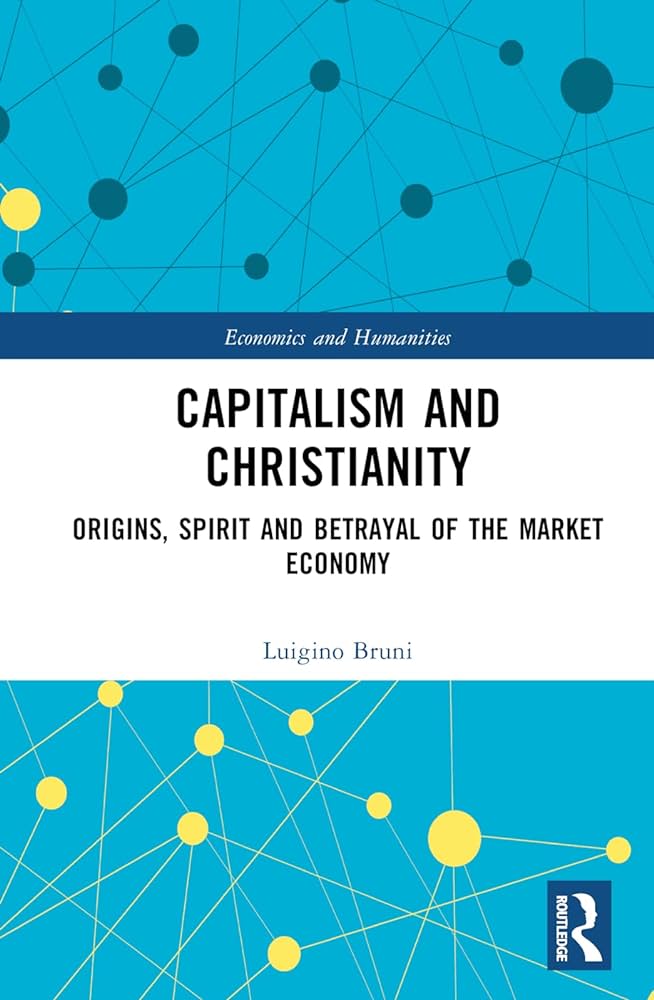
In Capitalism and Christianity, Luigino Bruni provides a sweeping overview of various strands of Christian thinking about economic and, to some extent, social matters over the past 2,000 years and seeks to assess their impact. The book is short, comprising only 109 pages, but it covers a significant amount of ground and needs to be read slowly and reflectively. It is not for the casual reader or someone who is only interested in down-to-earth everyday economic issues but those who are interested in the history of ideas and want to think about their impact today will find much in it that is worth pondering.
Bruni accurately describes his work as an essay and some of its strengths and weaknesses reflect its nature. In particular, Bruni does not seek carefully to support all of his assertions and many of his statements are highly contentious (e.g. is it really true that ‘Christianity was not the mass culture of the Middle Ages’, [page 90] and that ‘we had to wait until the second part of the second millennium for Christianity to become, at least a little, popular culture in the countryside’ [page 97]?). He also has a tendency to make statements that sound impressive without their meaning being clear (e.g. the statement that: ‘The medieval man was in general much poorer than we are, but he lived in a richer world, denser with life’ [page 36]) and he does not define his terms closely, the most serious omission being his failure to explain precisely what he means by ‘capitalism’. However, the other side of this point is that Bruni makes suggestive links between things that might otherwise be regarded as discrete and draws attention to long-term trends that might otherwise be missed.
He briefly considers the teaching of the New Testament but focuses primarily on that of Christian thinkers down the ages, starting with an interesting contrast between the economic thinking of Augustine and that of Pelagius before taking in that of well-known figures such as Dante, Luther, Calvin, Hobbes and Smith. There is plenty to take issue with in his analysis (e.g. his suggestion that, thanks to Hobbes, ‘European society…went from the community without individuals, to the individual without community’ [page 72], surely attributes far too much influence to Hobbes). However, much of what is said is thought provoking and a lot of it relates to matters that are only rarely covered in English language publications.
His discussion of medieval monasticism is a good example of this. He rightly points out the significance of the monasteries to the medieval economy and the long-term impact of the Benedictine motto ‘Ora et Labora’ (prayer and work), particularly as taken up and applied to everyday life in Lutheran thought. As often, Bruni is guilty of some exaggeration (e.g. the statement that ‘capitalism was not only generated by monasticism, but would not have been borne without it’, [page 14]) but his contention that, at least as originally conceived, the monastic emphasis on the value of work for a free person helped generate a wider acceptance of the value of work in society as a whole is well worth considering.
Bruni’s discussion of the late medieval Monti di Pieta is also interesting. Few Anglo-Saxon readers will know much (if anything) about them but they deserve to be taken into account in any consideration of historic models of the use of credit in the alleviation of poverty. Franciscan friars provided the impetus for their creation as not-for profit organisations which, nonetheless, were not charities and which sought to make credit available to the poor whilst still charging interest and seeking sustainability in their business model. Bruni clearly sees some lessons for today in this model, although he does not give detail of precisely what these lessons might be.
It is also good to see a discussion of the now largely forgotten contribution of Jansenists to the theological and economic debate. Jansenist theology was in many ways similar to Calvinism (albeit located within Catholicism) and it is interesting that it produced some recognisably similar economic thinking. This in some ways anticipated Adam Smith and classical liberal economics. For example, Pierre Nicole, writing a hundred years before Adam Smith, noted that those who served travellers did not act from charity but nonetheless provided the assistance that travellers required, whilst Pierre Boisguilbert, writing slightly later, commented that ‘All the trade of the land, both wholesale and retail…is governed by nothing but the interests of entrepreneurs who have never thought of doing someone a favour’ (cited by Bruni on page 60).
Bruni is Professor of Economics at the Università di Roma LUMSA, which states that it was ‘formed on Catholic principles’ and, in some places, his Catholic background shines through his writing. However his views on the impact of Catholicism on economics will not make comfortable reading for many of his Catholic colleagues. Although he is critical of the impact of the Reformation, he reserves his most strident criticism for the Counter-Reformation. He attacks both its theology and practices (suggesting that it was so concerned to react against Luther that it failed to deal with the aspects of Catholicism that were the most in need of true reform [page 44]) and sees its influence on the economy in almost wholly negative terms: ‘the Counter-Reformation blocked the process which had started in the middle-ages and which resulted in civil humanism, a capitalism that was both personalist and communitarian, which was able to fuse together individual freedom and common good’ (page 87) and ‘the Counter-Reformation set the moral evaluation of economic activities back a few centuries’ (page 88). Overall, he has very little positive to say about the contribution of Christian thought to appropriate economic structures over the past few hundred years.
It is less easy to be sure of what Bruni favours. He often quotes other authors without being clear of the extent to which he agrees with them. However, he is no other-worldly theorist. For example, he refers to ‘An entirely biblical and evangelical secularity…which still leaves all those who (like me) believe that there are few things more “spiritual” than double-entry method and a construction site, breathless’ (page 24). Furthermore, his most favourable tone is reserved for what he refers to as ‘civil economy’. He quotes at length from Fénelon’s ‘Les Abeilles’ (the precursor of Mandeville’s more famous Fable of the Bees) and he contrasts what he understands Adam Smith to be saying unfavourably with a different approach in which ‘the fundamentally economic principle…is instead that of “mutual assistance”, where each individual, in addition to his own interest, intentionally wishes for the interests and well-being of the other party as well’ (page 79).
Bruni writes openly from the perspective of Catholic Southern Europe and he clearly feels personal involvement in the matters about which he is writing. Capitalism and Christianity is not a mere academic essay: Bruni cares deeply about his subject and, as the book draws towards its conclusion, he begins from time to time to write in the first person.
Sadly, he is not able to offer much hope for himself or others. Referring to the people of the South (and, one suspects, primarily, Italy), the book concludes: ‘the capitalism of the nineteenth and twentieth centuries, the capitalism based on the factory and labour, could not then be seductive enough to buy our souls. But that of the twenty first century based all on consumption and finance, seduced us to a point that we did not need to buy our souls because we gave them for free’ (sic; page 108).
This is perhaps a surprising conclusion, especially from a writer who clearly regards Augustinian theology as much too pessimistic about human nature. It may be influenced by the slightly Romantic tendency that may be detected in some of what Bruni says. However, Bruni might fairly counter by saying that his essay is not intended to offer a way forward but merely to enable people to think about how we have arrived where we are and thus be able to pose questions that will facilitate the fashioning of the future.
Much of what Bruni says is contentious and one might take strong exception to his negative assessment of particularly early Protestant thinking, Adam Smith’s views and more recent Catholic social teaching. However, the issues that he raises deserve careful reflection and Capitalism and Christianity is a serious and worthwhile contribution to a vital debate.
‘Capitalism and Christianity: Origins, Spirit and Betrayal of the Market Economy’ by Luigino Bruni was published in 2024 by Routledge (ISBN: 978-1-03-252401-6). 109pp
 Richard Godden is a Lawyer and has been a Partner with Linklaters for over 25 years during which time he has advised on a wide range of transactions and issues in various parts of the world.
Richard Godden is a Lawyer and has been a Partner with Linklaters for over 25 years during which time he has advised on a wide range of transactions and issues in various parts of the world.
Richard’s experience includes his time as Secretary at the UK Takeover Panel and a secondment to Linklaters’ Hong Kong office. He also served as Global Head of Client Sectors, responsible for Linklaters’ industry sector groups, and was a member of the Global Executive Committee.